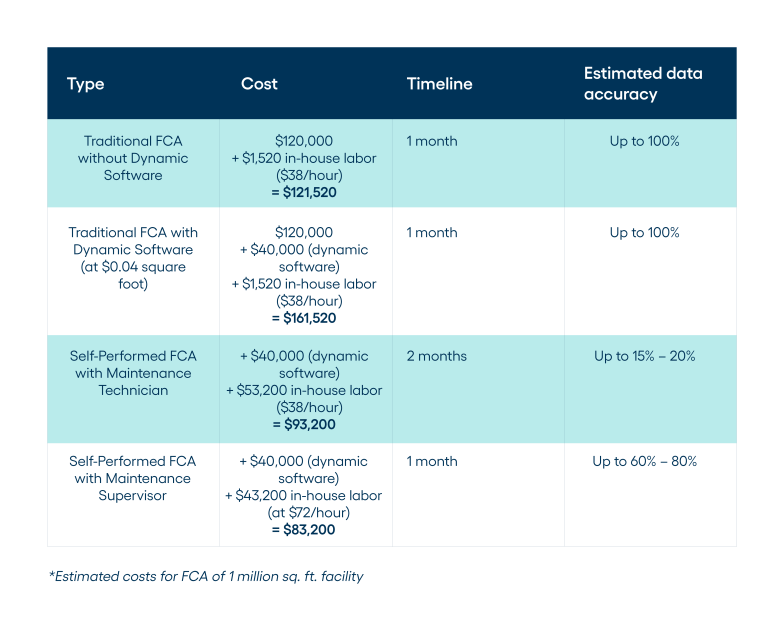Self-Performed FCAs vs Traditional Methods: Which Is Right for Your Facility?
In today’s data-driven world, effective facilities management goes beyond just maintaining buildings. Now, it’s about leveraging facility data to prioritize maintenance and control costs.
With aging infrastructure and limited resources, regular, accurate facilities condition assessments (FCAs) are essential. Yet, many organizations struggle to organize their valuable facility data, relying on outdated spreadsheets and lacking insight into potential equipment failures.
In this post, we'll explore how to use FCAs to gain visibility into asset conditions, allocate resources efficiently, plan capital investments, and justify funding to the C-suite.
Traditional FCAs vs self-performed FCAs
Traditional third-party FCAs offer highly accurate, valuable data, but they're typically conducted only once every 10–15 years due to the high cost and complexity of hiring external consultants. As a result, data older than five years can become outdated, leaving facilities, especially healthcare ones with frequent asset turnover, relying on obsolete information for critical decisions.
Typically, traditional FCAs can cost in the range of $0.12 to $0.20 per square foot. For a 1-million-square-foot facility, the baseline low-end cost would be approximately $120,000, plus an approximate $1,520 (at an estimate of $38/hour) for in-house labor.
The process usually takes about a month, with one week on-site for data collection and up to three weeks for validation, report building, and data cleaning. For best results, it's important to have an in-house expert accompany assessors to ensure accurate data collection.
Self-performed FCAs, on the other hand, provide a cost-effective alternative, allowing organizations to maintain accurate data and reduce costs without sacrificing quality or control. By bringing FCAs in-house, facilities can spot issues early, ensure compliance, and extend their budgets further.
For example, the city of Asheville, NC conducted an FCA and found that many of its buildings would reach a “failed state” within two decades. This insight helped them secure an additional $3.5 million annually for facilities maintenance, putting them far ahead in their planning.
With a self-performed FCA for a 1-million-square-foot facility, your total out of pocket is about $40,000 for the dynamic software, plus all in-house labor costs to perform the on-site assessment and data scrub.
Depending on efficiency, if performed by a maintenance technician, labor can run roughly $53,200 (at $38/hour) for a turnaround time of up to 2 months. If performed by a maintenance leader/manager, labor can cost $43,200 (at $72/hour) for a turnaround time of up to one month.
Here’s an estimated breakdown of the total costs for each, as well as the estimated accuracy of the data collected:

Best practices for FCA implementation
FCAs are not just about collecting data – they're about creating a sustainable, repeatable process that provides ongoing value. Several key factors contribute to successful self-performed FCAs:
- Continuous data collection: Replace periodic assessments with ongoing data gathering to maintain current insights.
- Standardized data: Implement consistent data collection methods to ensure comparable, reliable analytics.
- Technology integration: Leverage smart software solutions and mobile access to transform raw data into actionable intelligence.
- Data-literacy training: Ensure teams understand how to collect, interpret, and act on facility data.
- Strategic data prioritization: Focus on high-impact data points that drive decision-making first, then expand scope as needed.
Conclusion
Self-performed FCAs represent more than just a cost-saving measure. They're a strategic approach to facility management that provides organizations with greater flexibility and control. With the right tools and processes in place, facilities teams can maintain high-quality asset data to improve capital planning and simplify maintenance decisions.
Download our FCA checklist here or learn more about Brightly Origin, world-class strategic asset management, asset health, and capital planning solution.



